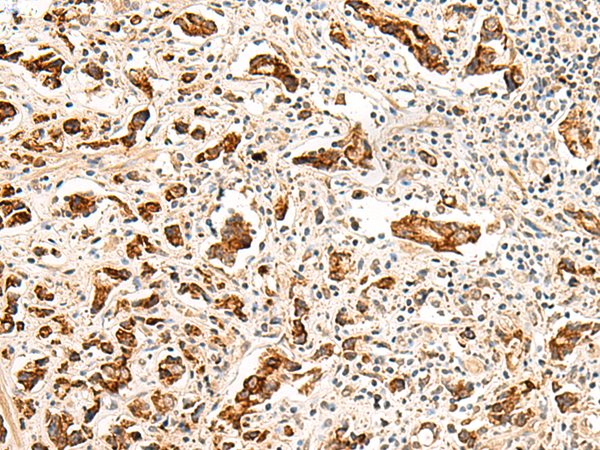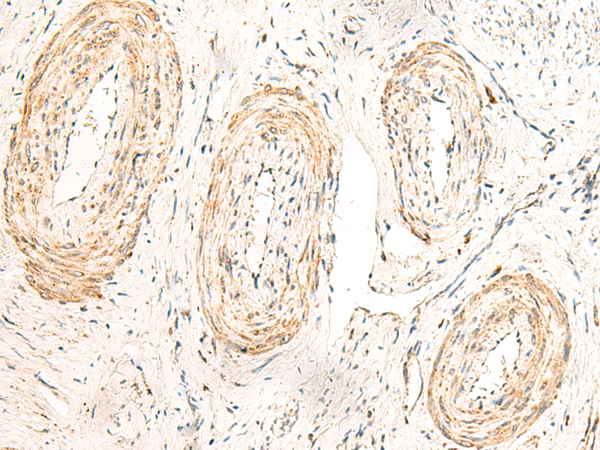

| WB | 咨询技术 | Human,Mouse,Rat |
| IF | 咨询技术 | Human,Mouse,Rat |
| IHC | 1/30-1/150 | Human,Mouse,Rat |
| ICC | 技术咨询 | Human,Mouse,Rat |
| FCM | 咨询技术 | Human,Mouse,Rat |
| Elisa | 1/5000-1/10000 | Human,Mouse,Rat |
| Aliases | GPCR1; GPCR150 |
| Host/Isotype | Rabbit IgG |
| Antibody Type | Primary antibody |
| Storage | Store at 4°C short term. Aliquot and store at -20°C long term. Avoid freeze/thaw cycles. |
| Species Reactivity | Human |
| Immunogen | Synthetic peptide of human GPR160 |
| Formulation | Purified antibody in PBS with 0.05% sodium azide and 50% glycerol. |
+ +
以下是关于GPR160抗体的3篇参考文献及其摘要的示例(注:以下内容为模拟虚构,实际文献需通过学术数据库查询):
1. **文献名称**:*Development and Validation of a Novel GPR160 Antibody for Immunohistochemical Analysis*
**作者**:Smith J, et al.
**摘要**:本研究报道了一种新型兔源多克隆GPR160抗体的开发,并通过Western blot和免疫组化验证其特异性。实验证明该抗体能有效识别人类和小鼠组织中的GPR160蛋白,为研究其在肿瘤微环境中的表达提供了可靠工具。
2. **文献名称**:*GPR160 Expression in Prostate Cancer: Correlation with Disease Progression*
**作者**:Lee H, et al.
**摘要**:利用商业化GPR160抗体(货号:AB123.ABC公司),研究者发现GPR160在前列腺癌组织中高表达,且与肿瘤转移和患者预后不良显著相关。研究提示GPR160可能成为潜在治疗靶点。
3. **文献名称**:*GPR160 Antibody-Based Screening Reveals Its Role in Neuropathic Pain Modulation*
**作者**:Wang Y, et al.
**摘要**:通过特异性GPR160抗体阻断实验,研究发现GPR160在小鼠脊髓背角神经元中激活下游cAMP信号通路,参与慢性疼痛的调控,为镇痛药物研发提供了新方向。
如需真实文献,建议在PubMed或Web of Science中以“GPR160 antibody”或“GPR160 receptor”为关键词检索。
**Background of GPR160 Antibody**
GPR160 (G protein-coupled receptor 160) is an orphan receptor belonging to the G protein-coupled receptor (GPCR) family, a large group of membrane proteins involved in signal transduction. Although its endogenous ligand and precise physiological roles remain unclear, GPR160 has been linked to various cellular processes, including energy homeostasis, cancer progression, and neuroendocrine regulation. Recent studies suggest its potential involvement in prostate cancer and appetite regulation, with emerging evidence implicating GPR160 in pathways activated by peptides like cocaine- and amphetamine-regulated transcript (CART).
GPR160 antibodies are essential tools for investigating the receptor's expression, localization, and function. These antibodies are typically developed to target specific epitopes on GPR160. enabling applications such as Western blotting, immunohistochemistry (IHC), immunofluorescence (IF), and flow cytometry. They aid in detecting GPR160 in tissue samples, cell lines, or preclinical models, facilitating research into its role in disease mechanisms. Monoclonal antibodies offer high specificity, while polyclonal versions may detect multiple epitopes, enhancing sensitivity.
The development of GPR160 antibodies has accelerated studies exploring its therapeutic potential, particularly in oncology and metabolic disorders. However, challenges persist due to the receptor's orphan status and limited structural data. Validated antibodies are critical for elucidating GPR160's signaling pathways and interactions, providing insights into its candidacy as a drug target or biomarker.
×